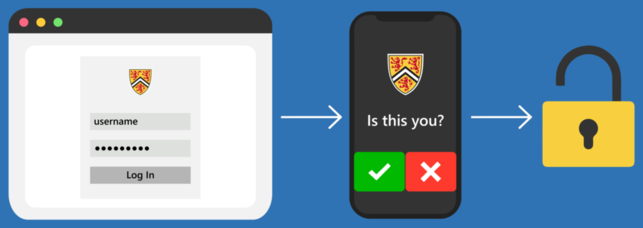Kanopy | Jira Service Desk | Teams Live Events | 2FA | Student Information Systems
Kanopy Media Streaming announced
 This past August, IST announced the availability of Kanopy, a new on-demand video streaming service for Waterloo faculty and instructors.
This past August, IST announced the availability of Kanopy, a new on-demand video streaming service for Waterloo faculty and instructors.
In collaboration with some members of the faculty community, and with advice from Kanopy, IST pre-populated the Waterloo Kanopy Library with commonly viewed and/or requested titles. However, the “Patron Driven Acquisition” license model allows for significant flexibility in managing the Waterloo Kanopy Library. More information on using this service is available on the IST website.
Jira Service Desk is coming
 Piloting the platform
Piloting the platform
Earlier this year, using the IST Service Desk support email, helpdesk@uwaterloo.ca, IST began a pilot of the Jira Service Desk platform to assess and evaluate its effectiveness as a ticket management and integrated IT service management (ITSM) solution. Over this four month period approximately 5,000 support tickets were processed. During this time, Jira Service Desk was also piloted by IST's Project Management Office, the Arts Computing Office, and throughout a number of Academic Support Units, including CEE and the Secretariat.
Based on the results of these pilots, growing interest and demand for the platform, and significant adoption of the Atlassian suite of products across campus, IST will purchase Jira Service Desk (cloud) with licenses to support expanded use of the solution.
Expanding use of Jira Service Desk
We are in the very early stages of formulating a project team to support the expansion of this new tool and will be in touch over the coming weeks to provide greater detail on this work and the impact for IST.
Feel free to reach out to IST director of client services Andrew McAlorum with any questions or concerns you may have related to this work.
Supporting University events with Teams
 Given our current remote working and learning environment, live online events that allow participants to share information and interact with peers in real-time are very popular. Since the spring term, IST has supported a number of University events, working closely with organizers to determine event requirements, configure the platform, conduct online tests, and assist during the live event should any issues arise.
Given our current remote working and learning environment, live online events that allow participants to share information and interact with peers in real-time are very popular. Since the spring term, IST has supported a number of University events, working closely with organizers to determine event requirements, configure the platform, conduct online tests, and assist during the live event should any issues arise.
Teams event requests can be submitted via the Request Tracker system and a Client Services rep will reach out to begin the process.
About the events supported so far
The event topics range from orientation and information sessions, to ceremonies, general meetings, and "fun" events like the past Alumni Family Day, which allowed participants to experience live magic tricks, science experiments, and a concert, virtually!
Events also range in size from under 30 participants to nearly 1,700 -- a number that marked both the largest live Teams event held and the largest number of participants for a President's Town hall.
Some past and upcoming events
- Waterloo Innovation Summit Part 1
- Continuous Improvement Virtual Session
- Alumni Family Day (8 hour event)
- Renison Virtual Town Hall (2 times)
- PHD Graduation Celebration
- Wellness Collaborative Event
- Academic Integrity Event
- Waterloo Innovation Summit Part 2
- President’s Town Hall – undergrad
- President’s Town Hall – Grad
- New Faculty Orientation Event
- Academic Integrity Council of Ontario General Meeting
- Black Lives Matter Here
- Online Course Development: Tools, Tips & Techniques
- Ideas Clinic Collaboration Spaceship Launch Event
- Pharmacy Town Halls (4 times)
- Cultural Sensitivity in Healthcare
Mandatory two-factor authentication coming November 3, 2020
As announced in a memo shared on June 10, 2020, effective November 3, 2020, two-factor authentication (2FA) will be required to access a number of campus systems, including Office 365, Workday, Quest, LEARN, Concur, Unit4, and other systems supporting single sign-on authentication.
What this means for you
Effective November 3, 2020, your username and password alone will be insufficient to access the systems listed above. Only accounts protected by our 2FA service, Duo Security, will be permitted access.
Action required
Visit our 2FA website to learn more about Duo 2FA and to enrol your device(s) in the Duo Mobile App. This process takes only a few minutes and you are encouraged to enrol early to familiarize yourself with this service.
Employees who would prefer to use a token authenticator should complete the 2FA Token Request form by September 30, 2020 to ensure the token is delivered before the November 3 implementation date. Tokens can be requested past this date; however, receipt of the token may be delayed, which will delay your access to 2FA supported websites/applications.
Tip: Reduce the number of authentication prompts you receive from an application each month by selecting Remember me for 30 days when you receive a prompt.

Student Information Systems (SIS) team responds to COVID-19
The first five months of the COVID-19 pandemic were quite busy for the Student Information Systems team (SIS), both those members within IST and our partners within the Registrar’s Office (RO), Graduate Studies and Postdoctoral Affairs (GSPA), Student Finance (SF) and Centre for Extended Learning (CEL). With the announcement that the University was suspending and then cancelling all in-person classes, our IST team worked with a number of departments (RO, GSPA, Finance, CEL) to handle required additions/modifications within the Student Information System, Quest.
As all parts of Quest are interconnected, it was necessary to have all the areas involved communicating closely with each other. Meetings were held three times a week to ensure that everyone was aware of decisions and infrastructure changes being made. The following outlines some of this work.
Student Self-Service
New development was added to assist with the various impacts of COVID-19. These pieces of development were designed to be flexible (e.g. handling differences between Faculties), informative, and allow for future use/changes, if necessary.
Credit / No Credit Grade
The winter term was impacted by the suspension and cancelling of in-person classes and modifications to they way exams were handled. To handle this, new development allowed undergrad students who felt their grades had been affected by their inability to complete the term as expected, to change their numeric grade to a Credit/No Credit grade.
The impact of this change on a student’s record also had to be clearly presented to the student. Of the over 25,000 students eligible to take advantage of this page, over 6,000 students did make changes, with 750 later changing them back.
Convocation Future Participant
When it was announced that the Spring Convocation was to be cancelled, the University still wanted, at a future date, for students to receive their degrees and walk across the stage.
A new page was added to allow the students who had completed their degrees to indicate that they would be attending a future convocation ceremony.
Bursary Application
A new online bursary application was built to provide a responsive questionnaire to collect information from students and guide them through applying for financial assistance.
With the addition of the Academic Bursary, a bursary to help with technical expenses caused by COVID-19, applications for assistance jumped from 300 to over 4,500.
To support these changes, modifications to the OSAP interface were also made.
 6,000+
6,000+students change their numeric grade to a Credit/No Credit grade
 4,500+
4,500+Academic Bursary applications received
Behind the scenes changes to support the front-end user experience
Processes that in the past had little volume and could normally be handled manually now needed some batch coding assistance. Significant "behind the scenes work" went into supporting these user-facing processes, which included:
- The addition of messages about COVID-19 being added to student transcripts
- Modifying start and end dates for Spring term courses
- Removing meeting times from Spring term classes as the schedule had already been set
- Changes to handle the increase of applicants deferring for the Fall term
While all these changes were taking place, other projects continued within SIS. Two of the more substantial projects include:
- Student Finance was completing a longer-term project to simplify and improve Undergrad Tuition processes. The team was able to reduce the complexity of UG tuition groups, reducing the number of groups from 27 to 8, and simplify term fee codes, reducing the number of codes from 1237 to 373. They also improved testing methods and staff efficiency related to using new tools.
- The interface to the Application Centre (OUAC) was redesigned and rewritten to handle a substantial legislated change.
While these COVID-19 related changes are being completed, the SIS team will continue to work to handle new changes that are introduced.






